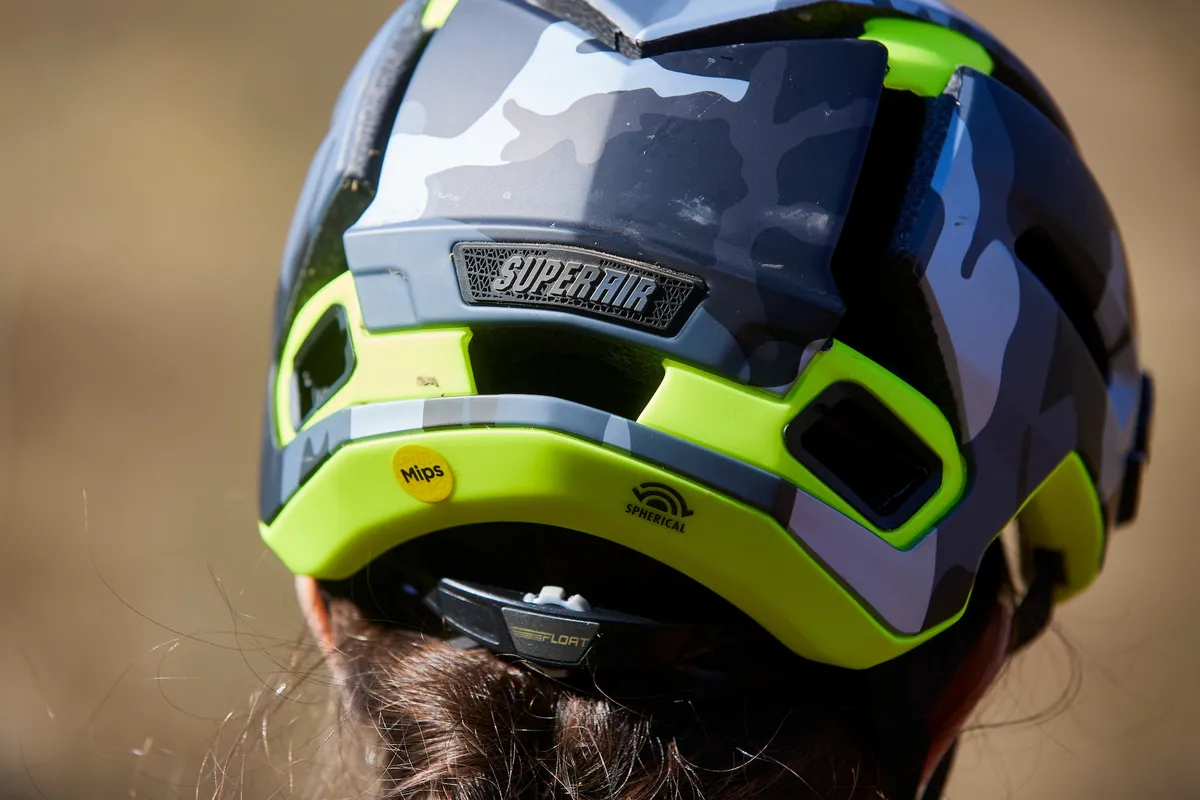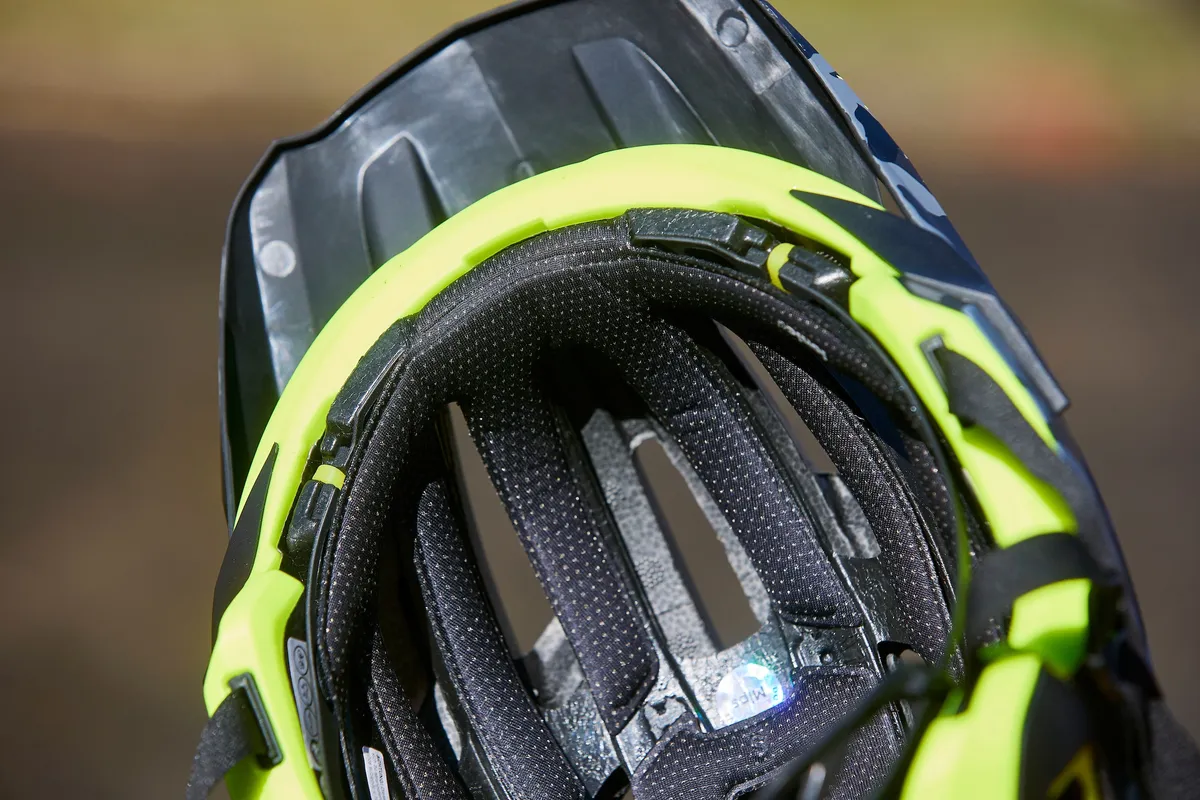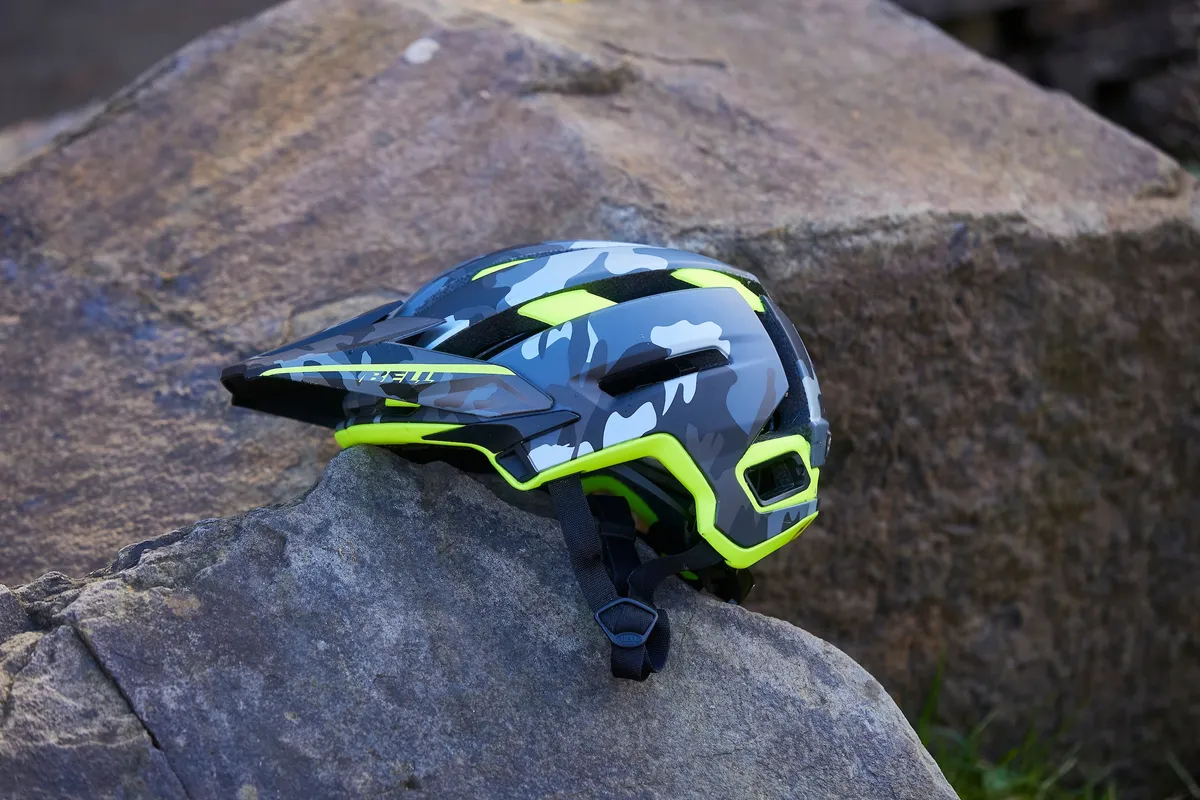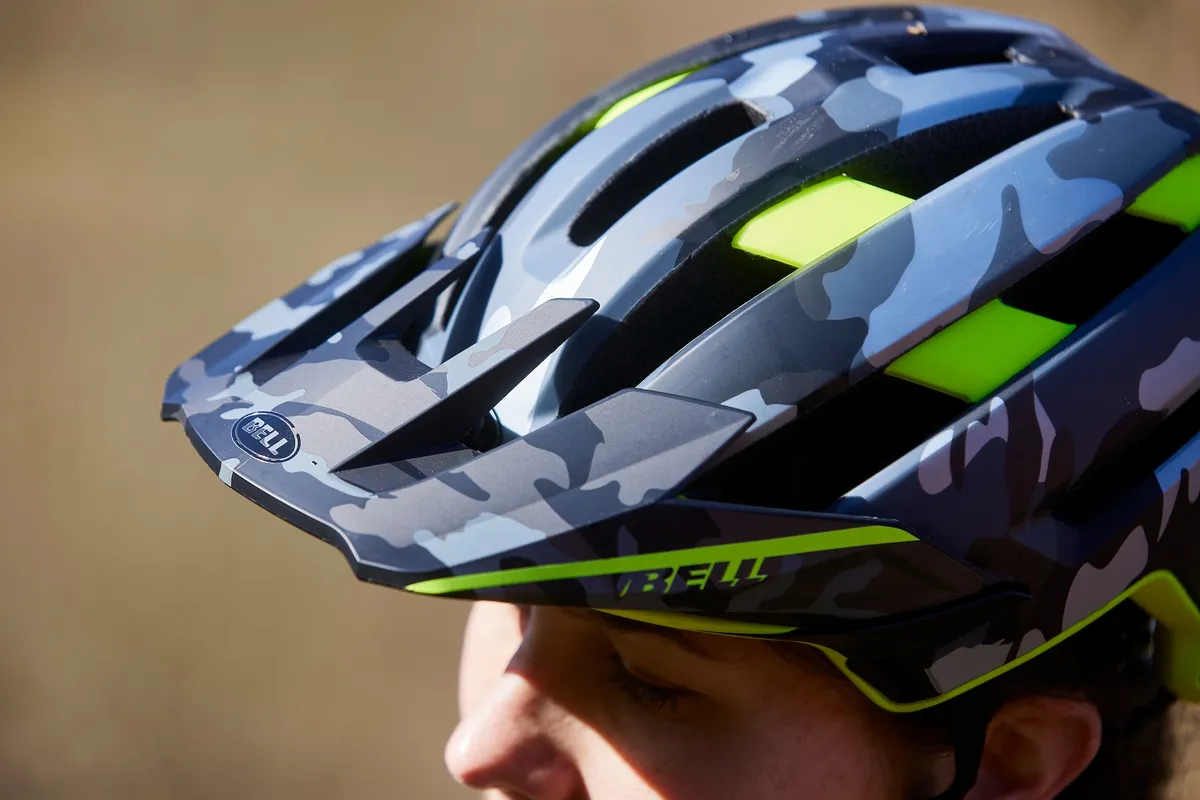Bell claims the Super Air Spherical is its most advanced trail helmet.
Coming from a brand with such a rich history in mountain bike head protection, we would expect it to be rather good.
The Super Air Spherical gets all the safety features you'd expect from such an expensive helmet. There’s an in-mould polycarbonate shell, Flex Spherical MIPS protection and dual-density EPS foams.
Bell Super Air Spherical helmet details

Like other brands, Bell uses an in-moulding construction to bond the polycarbonate shell to the first layer of EPS foam. This should give the mountain bike helmet a robust yet lightweight design.
While the shell is designed to shrug off light bumps and bangs to keep the helmet usable through normal wear and tear, the Super Air Spherical uses two layers of EPS foam for impact protection.
The outer layer is a denser foam, which should take the sting out of higher-speed impacts. The inner layer of EPS is a less dense construction that should provide better absorption of lower-speed impacts.
How these two layers connect and move against each other is where Bell's Flex Spherical technology employs MIPS (Multi-directional Impact Protection). The two brands collaborated to construct the design used in the Super Air Spherical.
Instead of the traditional MIPS liner that sits below the foam and against the rider's head, Bell connects the two differently dense foams with MIPS. That enables the outer EPS foam to slide over the inner foam in all directions.
The padding and retention cradle are attached to the inner EPS foam. This gives the helmet a more robust design.
Bell uses a 360-degree retention system with a micro-adjust dial at the rear to fine tune the fit. The rear cradle is height-adjustable, with four positions to choose from.
Bell uses the antimicrobial Ionic+ padding that attaches via Velcro to the retention cradle and EPS foam so it can be removed and washed.

There are 17 vents in the Super Air Spherical, designed to keep you cool. In the brow, there are four small vents to enable airflow to the forehead. Unfortunately, these are only present in the outer EPS layer and don’t follow into the inner EPS layer, which is intended to act as a barrier.
The peak is adjustable with three indexed positions. The highest leaves plenty of space to stash a pair of mountain bike glasses underneath, even though there are no dedicated glasses mounts.
This helmet also has a couple of tricks up its sleeve. One of the vents on the top of the helmet doubles as an action camera or light mount. A bracket supplied with the helmet clips into the vent so you can attach your equipment of choice.
You can also add a chinbar to the helmet (£89.99), which will convert the open face to a lightweight full-face helmet.
The Super Air Spherical helmet isn't cheap at £224.99, and hasn’t been rated by Virginia Tech. There are three sizes available: small (52-56cm), medium (55-59cm) and large (58-62cm), with a size-small weighing 394g.
Bell Super Air Spherical helmet performance

The Super Air Spherical has a ball-like shape, which helps keep its profile slender. Riders looking for a minimalist design will appreciate it. Even so, it’s one of the weightier helmets in the test, but it wasn’t a chore to wear it all day thanks to its comfort.
The helmet's shape provides protection where you need it and has ample coverage over the temples and back of the head.
It scores top points for comfort, even edging out the Troy Lee Designs Flowline and Scott Stego Plus helmets I've also tested. Its shape and plush padding cradle your head like a well-fitting glove.
The retention system and cradle offer equal amounts of comfort and don’t pinch or cause pressure points when tightened up. I was happy to ride in the Bell for extended periods without having to adjust or fiddle with it.
I never noticed it moving around over rough trails or slipping when hitting hard compressions.
The Flex Spherical system didn’t creak when riding either. It’s hard to tell how good this system really is, but its strong construction certainly made me feel more confident in its capabilities than some of the weaker MIPS liners that are available.
The peak, in its lowest setting, is in your vision when riding. I found this distracting, so I pushed it into its middle setting, which kept it out of my line of sight.

You can feel the arms of mountain bike glasses resting on the cradle behind your ears, but it doesn’t interfere with them. There are helmets that hold your glasses better, though.
Ventilation is middling. The Super Air Spherical is not a hot helmet, and it performs an admirable job of dumping excess heat, but its small front vents don’t provide cooling as effectively as some others I've tested. However, the thick padding should help soak up sweat.
The mounting bracket is a smart idea, especially for those who will want to attach a helmet light for night riding. The bracket clips in to provide a solid connection to attach items to.
I didn't test the chin bar, so can’t comment on that.
How does the Bell Super Air Spherical helmet compare to the Smith Forefront 2?
If you’re going to pay top dollar for a mountain bike helmet, these two might make your shortlist. However, the more expensive Bell offers better comfort and has a more robust feel.
The MIPS Spherical tech and its dual-density EPS foam are particularly impressive, and it's more vented than the Koroyd system used in the Smith helmet. The Bell has plusher padding, while both have adjustable retention systems and peaks.
The Bell would be my pick of the two by a small margin.
Bell Super Air Spherical helmet bottom line
The Super Air Spherical has build quality and comfort that are second to none. The price is terribly high, but the Flex Spherical MIPS design makes the helmet feel safer.
The helmet's design is not quite perfect, but it covers the most important bases well.
And if you're not sold on its colour, other options are available.
How we tested
These helmets make up our 2023 trail helmets group test.
We tested nine open-face lids from a range of brands, featuring different tech and takes on performance and comfort to see who came up with the goods.
Product
| Brand | bell |
| Price | 224.95 GBP |
| Weight | 394.0000, GRAM (Small) - |
Features
| br_MIPS | yes |
| br_helmetType | mountain_bike_open_face |
| br_smartHelmet | no |
| Features | MIPS Spherical, adjustable retention cradle, adjustable peak, goggle fitment |
